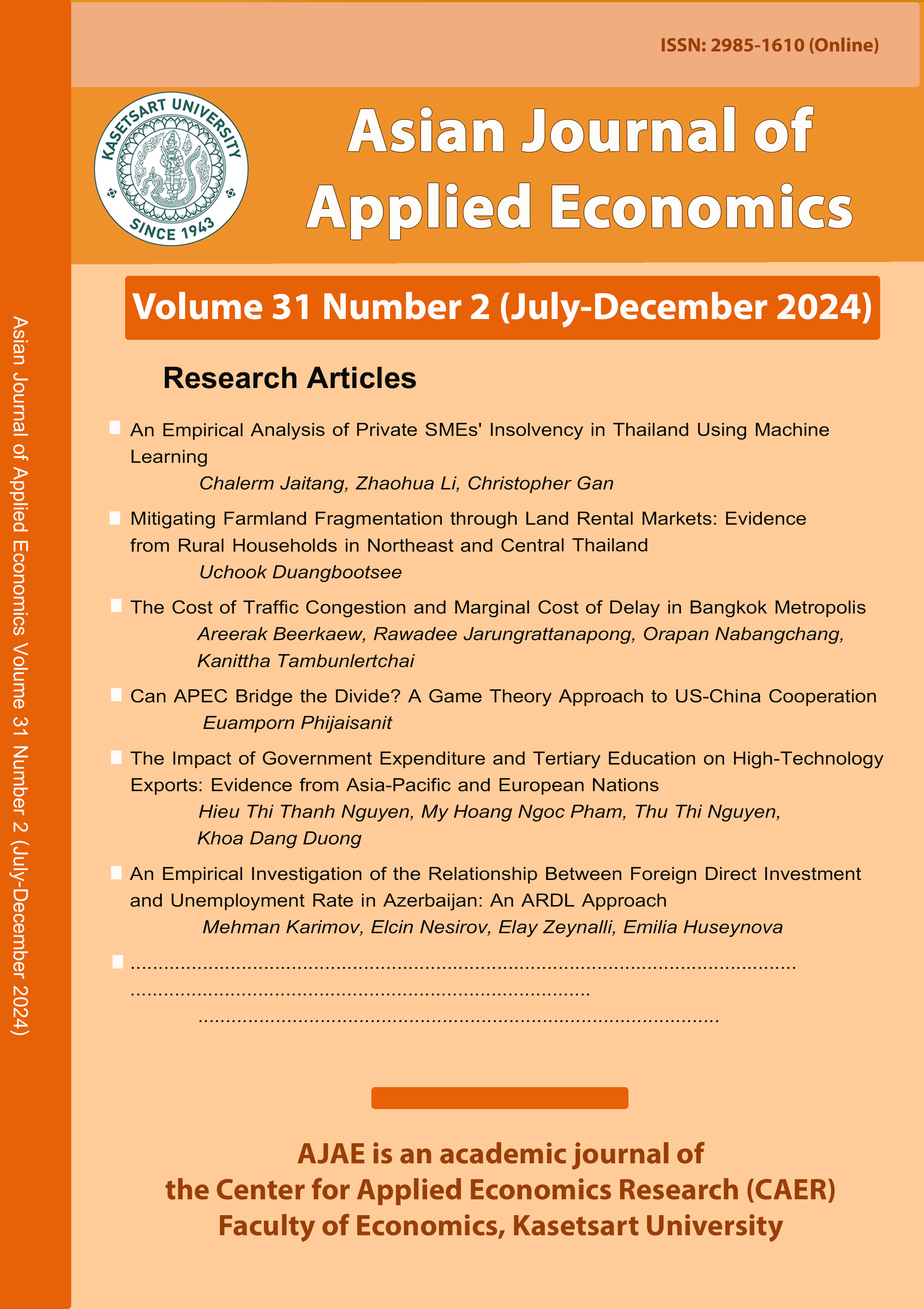Can APEC Bridge the Divide? A Game Theory Approach to US-China Cooperation
Main Article Content
Abstract
The escalating US-China rivalry threatens to impede economic integration within the Asia-Pacific Economic Cooperation (APEC) forum. This paper departs from the existing literature by analyzing specific actions of both countries that exemplify a focus on short-term gains. It argues that by understanding the dominance of short-run gains in current US-China actions, a framework that emphasizes long-term cooperation becomes particularly relevant. Employing game theory, the paper examines APEC's future prospects. The paper analyzes potential cooperation and conflict scenarios based on economic incentives and strategic considerations. While the current rivalry resembles a Prisoner's Dilemma, the paper explores alternative game structures, namely; Repeated Games and Supergames, that can incentivize cooperation on shared economic objectives. The analysis demonstrates that long-term benefits from cooperation can outweigh short-term temptations to defect, particularly if APEC institutions foster trust and transparency. Ultimately, the analysis highlights the critical role of a strengthened APEC in promoting a stable and cooperative equilibrium, thereby fostering long-term economic prosperity for the entire Asia-Pacific region.
Article Details

This work is licensed under a Creative Commons Attribution-NonCommercial-NoDerivatives 4.0 International License.
The paper is published under CC BY-NC-ND, in which the article is freely downloaded and shared in its original form non-commercially and its citation details are identified.
References
Ahn, T. K., Ostrom, E., Schmidt, D., & Walker, J. (2003). Trust in two-person games: Game structures and linkages. In E. Ostrom & J. Walker (Eds.), Trust and reciprocity: Interdisciplinary lessons from experimental research (pp.323-351). New York: Russell Sage Foundation.
Andreoni, J., & Miller, J. H. (1993). Rational cooperation in the finitely repeated prisoner's dilemma: Experimental evidence. The Economic Journal, 103(418), 570-585.
Axelrod, R. (1984). The evolution of cooperation. New York: Basic Books.
Bown, C. P. (2021). The US–China trade war and Phase One agreement. Journal of Policy Modeling, 43(4), 805-843.
Dal Bó, P., & Fréchette, G. R. (2019). Strategy choice in the infinitely repeated prisoner’s dilemma. American Economic Review, 109(11), 3929–3952.
Donnan, S., & Pickert, R. (2019). Trump’s China buying spree unlikely to cover trade war’s cost. Bloomberg Economics Report. Retrieved from https://www.bloomberg.com/news/articles/2019-12-18/trump-s-china-buying-spree-unlikely-to-cover-trade-war-s-costs.
Fudenberg, D., & Maskin, E. (1986). The folk theorem in repeated games with discounting and incomplete information. Econometrica, 54(3), 533-554.
Fudenberg, D., & Tirole, J. (1991). Game theory. MIT Press.
Gächter, S., & Herrmann, B. (2009). Reciprocity, culture and human cooperation: Previous insights and a new cross-cultural experiment. Philosophical Transactions of the Royal Society B:Biological Science, 364(1518), 791-806.
Gibbons, R. (1997). An Introduction to applicable game theory. Journal of Economic Perspectives, 11 (1), 127-149.
Hass, R., & Denmark, A. (2020). More pain than gain: How the US-China trade war hurt America. Brookings Commentary. Retrieved from https://www.brookings.edu/articles/more-pain-than-gain-how-the-us-china-trade-war-hurt-america/
Kandori, M. (2002). Introduction to repeated games with private monitoring. Journal of Economic Theory, 102(1), 1-15.
Kreps, D. M., & Wilson, R. (1982). Reputation and imperfect information. Journal of Economic Theory, 27(2), 253-279.
Ma, Y. (2024). China-US trade relations- statistics and facts, Statista. Retrieved from https://www.statista.com/topics/4698/sino-us-trading-relationship/#topicOverview.
Mosher, J. S. (2015). Speed of retaliation and international cooperation. Journal of Peace Research, 52(4), 522–535.
Osborne, M. J. (2003). An introduction to game theory. New York: Oxford University Press.
Palfrey, T. R., & Rosenthal, H. (1994). Repeated play, cooperation and coordination: An experimental study. The Review of Economic Studies, 61(3), 545–565.
Rand, D. G., & Nowak, M. A. (2013). Human cooperation. Trends in Cognitive Sciences, 17(8), 413-425.
Selten, R. (1978). The chain store paradox. Theory and Decision, 9, 127-159.
Young, H. P. (2008). Social norms. In S. N. Durlauf & L. E. Blume (Eds.), The New Palgrave Dictionary of Economics (2nd ed.). Palgrave Macmillan.
Wang, D. (2018). The unequal treaties and the treaty ports. Chinese Studies. Retrieved from https://www.oxfordbibliographies.com/display/document/obo-9780199920082/obo-9780199920082-0148.xml
Zandi, M., Rogers, J., & Cosma, M. (2019). Trade war chicken: The tariffs and the damage done. Moody’s Analytics. Retrieved from https://www.moodysanalytics.com/-/media/article/2019/trade-war-chicken.pdf.


